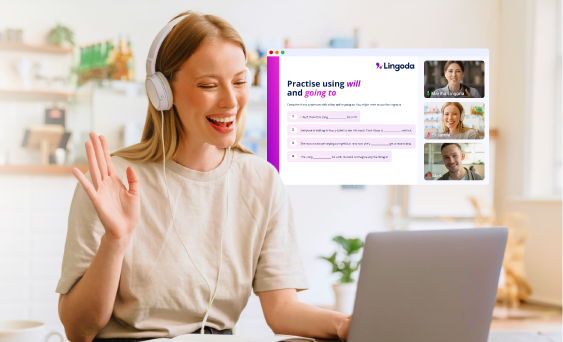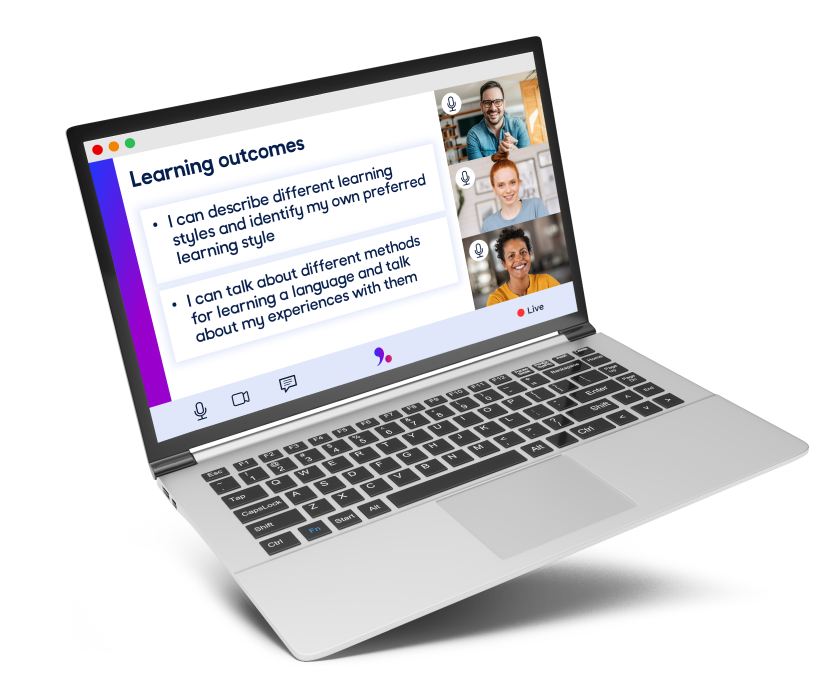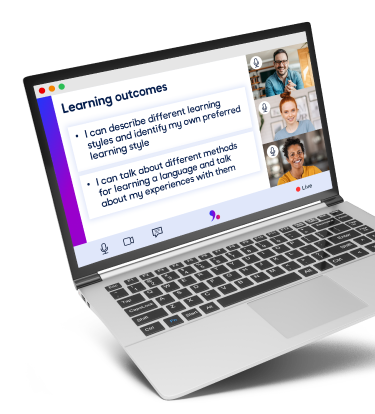


Expertly-designed curriculums
Follow our structured curriculum at each level, or choose the classes you’d like to take for complete flexibility.



With native-level teachers and courses for all levels, our live, online classes will transform your skills for those life-changing moments.



Follow our structured curriculum at each level, or choose the classes you’d like to take for complete flexibility.



Build your confidence and learn to express yourself easily through conversation, light debate and role-playing.



You’ll be surrounded by the language and encouraged to speak in classes that have a maximum of only 5 students.
Build your own language journey – for learners who want more flexibility.
2-month challenge with big rewards – for learners who want extra motivation.
Whether it’s the flexibility or our expert teachers, each of our students has a specific reason for choosing to learn with us.
Each course is divided into specific learning levels. We teach up to C1 in English and B2 in Business English.
Don’t know your English level?
Take our placement testBasic words and phrases
Simple interactions
Everyday conversation
Complex topics
Proficient language use
*Not available for Business English
Don’t know your English level?
Take our placement testWe don’t simply teach English from a textbook.
Through our rotation of international teachers, you’ll be exposed to a wide variety of accents, expressions and cultures. This means you’ll always learn the most up-to-date words and phrases used by English speakers worldwide.
And, in our Business English classes, we’ll prepare you for success in all contexts, teaching you to communicate, present and negotiate with confidence.




Peek inside a class, discover how to book a lesson and what extra studying opportunities there are for you.


As a Lingoda student, you can download the class materials for free and use them at any time. After your class, you will also find a quiz to help you refresh and practice your new skills. There are also downloadable exercises available. All materials are uniquely created by Lingoda experts to align with CEFR standards. If you want to learn more about CEFR, read more here.
After scheduling a class on our platform, you will be able to join the class with 2-4 fellow students from around the world. The teacher will introduce themselves and begin teaching the lesson using learning materials that you can download at the end of class. You will be able to interact with the teacher and other students, but there is no pressure to do so. Towards the end of class, the teacher will recap the lesson and ensure everybody has understood the lesson. Both group and private classes are very effective with Lingoda, but it depends on your personal preferences what you’d like to do.
No, we are not a language learning app. We are an online language school. And like any school, we offer live classes with certified, native-speaking teachers. At Lingoda, we believe that nothing can replace live interaction and customised feedback from a real person.
Preparing to learn English online with us is simple. You need three things: a stable internet connection, a computer and the free video conferencing tool Zoom.
It depends. As is the case when learning any new skill, your progress depends on your efforts. If you would like to learn English online quickly, then we suggest that you make language learning a consistent habit. Also focus and participate in class and complete the downloadable materials at the end of each class for best results. It also depends on which of Lingoda’s online English language courses you choose, as some of our plans are more intensive than others.
Yes. With our Business English course, you will learn all important aspects of the language including grammar, sentence structure and pronunciation. The only difference is that the vocabulary and topics in our Business courses are specifically designed to help you succeed in your career.
Yes, it will. If you use English in any aspect of your work, you will be able to speak it more confidently by the end of your course. You will be able to improve your networking, presentation, negotiation and interview skills as well as your writing skills. You’ll also learn how to write job application letters and resumes perfectly.

ESL means English as a Second Language. ESL is a teaching program or course that is designed to help non-native speakers learn the English language.Teachers of ESL will have special training and certifications. ESL courses will teach speaking, reading, and writing English. This is what we focus on at Lingoda. For adults, ESL classes will focus on how to learn English speaking for a work-related environment. For children, ESL classes focus on how to improve English speaking skills so they can be successful in an English-classroom environment.
There are four ways to learn English: online study, in-classroom study, self-study, and immersion. For those that want to know how to learn English at home, online English courses offer the best solution. Online courses with Lingoda offer flexibility of class times that work for you, all from the comfort of your own home. Self-study is another option for those looking at how to learn English at home. Unfortunately, you won’t get any feedback on how to improve. In-classroom study and immersion take you out of your home. Immersion means you are in a 100% English environment, possibly in an English-speaking country.
Students that want to know how to improve English communication skills need feedback. Feedback from a teacher or native speaker is the best way to get better. Imagine you learned a new word in English, but are using it the wrong way. Often, students will directly translate idioms or phrases from their language that don’t quite make sense in English. If no one ever corrects you, you will always speak incorrectly. This can lead to miscommunication or sometimes cultural misunderstandings. Feedback from a native speaker is critical to real improvement.
Another way to learn how to improve spoken English is by talking to a native speaker. This is also a solution for those who want to know how to gain confidence in speaking English. Often, a barrier for English-language learners is a lack of confidence to speak. Learners that were taught from a book or in a classroom are particularly shy and end up frozen at the bank, restaurant, or work. By regularly talking to a native speaker, you can break down this barrier and feel more comfortable in a real-world situation.
Depending on your native language, it could take up to 1,765 class hours to learn a language fluently. Increasing your hours listening to English is another method for those wondering how to improve their English communication skills. That could be watching movies or TV in English, listening to music or podcasts. Not just passive listening. You’ll need to actively focus on the words and meanings and maybe even write down new words or phrases. The more time you can spend surrounded by English, the better your English skills will be.
The difficulty of English will depend on your background. What is your native language (PS: if you’re a native Spanish speaker have a look at this page about “English for Spanish speakers“)? Have you studied English before? Do you watch a lot of Hollywood movies? These things will make a difference in learning English. Some aspects of English can be challenging. There are a lot of exceptions and irregularities in English that cause headaches such as verb changes. Not to mention vocabulary and pronunciation differences between American English, British English, South African, Australian, etc. Vowel sounds also change drastically in English as well. Any English learner that has looked at these words knows: through, thought, though.